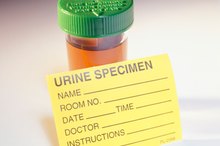Foods Safe to Eat with Stomach Ulcers
Stomach ulcers are sores that form in the lining of your stomach due to erosion of the protective mucus layer. Bacteria called Helicobacter pylori or long-term use of nonsteroidal anti-inflammatory drugs, such as ibuprofen and naproxen, can cause this erosion and expose the lining of your stomach to harmful digestive juices. Although foods do not cause ulcers, certain foods can increase acid production and further irritate your ulcer. Consuming foods that are more ulcer-friendly instead may reduce pain and help your ulcer heal.
Beverages
Caffeine-free beverages and low-acid juices including apple, grape and pear, are generally safe if you have a stomach ulcer. Drink mild herbal teas and plenty of water. Avoid all caffeinated beverages, including coffee, tea and cocoa, and do not drink alcohol. In addition, avoid all citrus and vegetable juices, which are high in acid.
- Caffeine-free beverages and low-acid juices including apple, grape and pear, are generally safe if you have a stomach ulcer.
Proteins and Dairy
Anusitis Diet
Learn More
Eat lean meats, including fish, poultry and seafood, and soy products such as tofu. Avoid high-fat meats such as sausage, salami, bacon and ham, as these foods may increase stomach acids, which can cause pain. When it comes to dairy, choose low-fat or fat-free products, and avoid full-fat varieties. Limit milk to 2 or 3 cups per day, and do not consume large quantities, which may increase stomach acid secretion.
- Eat lean meats, including fish, poultry and seafood, and soy products such as tofu.
- Avoid high-fat meats such as sausage, salami, bacon and ham, as these foods may increase stomach acids, which can cause pain.
Breads and Starches
Well-tolerated foods include pasta, rice, dry cereal, cooked cereal, bread, crackers and potatoes. Consume dried beans and peas with care, as they can cause you to experience increased gas. Eat gassy foods in small quantities until you know how they affect you. Avoid fried foods, greasy foods such as potato chips and spicy bagels or breads.
- Well-tolerated foods include pasta, rice, dry cereal, cooked cereal, bread, crackers and potatoes.
- Eat gassy foods in small quantities until you know how they affect you.
Fruits and Vegetables
The Best Food to Eat for a Stomach Ulcer
Learn More
If you have ulcers, eat fruits that are low in acid, such as apples, peaches, pears, grapes, kiwifruit, bananas, berries and melons. Avoid all citrus, as high-acid oranges, grapefruit, tangerines, lemons and limes may increase stomach acids. Consume vegetables that do not cause you pain, discomfort or excess gas. Broccoli, cabbage, cauliflower and brussels sprouts are gassy vegetables to avoid. Also avoid onions, garlic and spicy vegetables such as chili peppers. Tomatoes and tomato-based products are high in acid and may cause pain.
- If you have ulcers, eat fruits that are low in acid, such as apples, peaches, pears, grapes, kiwifruit, bananas, berries and melons.
Miscellaneous Foods
Use healthy oils such as olive and canola oil, and avoid butter, lard, margarine and products containing hydrogenated oils and trans fats. Limit your use of spicy condiments such as black pepper, chili powder and red pepper, which often cause heartburn.
Related Articles
References
- FamilyDoctor.org: Ulcers - What You Can Do to Heal Your Ulcer
- Drugs.com: Diet for Ulcers and Gastritis
- MayoClinic.com: Peptic Ulcer
- Cleveland Clinic: Peptic Ulcer Disease
- University of Maryland Medical Center: Peptic Ulcer
- Ohio State University Medical Center: Avoiding Gastric Stimulants Diet Changes for Ulcer Disease
- Vomero ND, Colpo E. Nutritional care in peptic ulcer. Arq Bras Cir Dig. 2014;27(4):298-302. doi:10.1590/S0102-67202014000400017
- Zaidi SF, Ahmed K, Saeed SA, Khan U, Sugiyama T. Can Diet Modulate Helicobacter pylori-associated Gastric Pathogenesis? An Evidence-Based Analysis. Nutr Cancer. 2017;69(7):979-989. doi:10.1080/01635581.2017.1359310
- Farzaei MH, Abdollahi M, Rahimi R. Role of dietary polyphenols in the management of peptic ulcer. World J Gastroenterol. 2015;21(21):6499-517. doi:10.3748/wjg.v21.i21.6499
- Zaidi SF, Ahmed K, Saeed SA, Khan U, Sugiyama T. Can diet modulate Helicobacter pylori-associated gastric pathogenesis? An evidence-based analysis. Nutrition and Cancer. 2017;69(7):979-89. doi:10.1080/01635581.2017.1359310
- Mandal MD, Mandal S. Honey: its medicinal property and antibacterial activity. Asian Pac J Trop Biomed. 2011;1(2):154-60.
- National Institutes of Health. Peptic ulcer disease: Discharge. Updated March 27, 2019.
- Ryan-Harshman M, Aldoori W. How diet and lifestyle affect duodenal ulcers. Review of the evidence. Can Fam Physician. 2004;50:727-732.
- Kulshreshtha M, Srivastava G, Singh MP. Pathophysiological status and nutritional therapy of peptic ulcer: An update. Environmental Disease. 2017;2(3):76. doi:10.4103/ed.ed_11_17
Resources
Writer Bio
Robin Doyle has been writing professionally since 2010. She has been a health-care professional for more than 25 years and uses her expertise to write health-related content on various websites. She is a certified clinical research professional with the Society of Clinical Research Associates.









